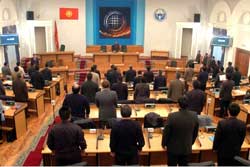
Kyrgyzstan's 54 newly elected lawmakers were sworn in
Sunday in Bishkek. (Xinhua)
Kyrgyzstan's 54 newly elected lawmakers were sworn in Sunday at this capital
city, in effect giving the Central Asian nation a second parliament besides the
old one and increasing tensions as the new government appears to have little
clear program to calm the massive looting in the country.
The parliament inauguration is a move believed to be in defiance of the
Supreme Court's decision Thursday to nullify the Feb. 27 and March 13
parliamentary elections.
With two parliaments vying for legitimacy, the political picture in this
energy-rich country appears all the more complicated.
One of the immediate challenges is how to operate in a country with two sets
of members of parliament.
The controversy over the legitimacy of parliament raised concerns that the
country's ongoing political crisis might not be solved anytime soon, as
parliamentary legitimacy holds the key to a solution which could be accepted by
relevant sides.
Bishkek is still jumpy after widespread looting following the lightning coup
which forced President Askar Akayev flee to Russia.
Tensions also increased when officials got word of a possible plot to kill
acting President Kurmanbek Bakiyev.
Bakiyev's new leadership is made up of a loosely united opposition that
includes many former government officials who have been at odds with one another
in the past.
And this energy-rich country is where both Washington and Moscow vie for
influence and each has a military base outside Bishkek.
That means the emerging new administration headed by Bakiyev has a mountain
of issues to deal with in the coming weeks as it attempts to stabilize the
country shaken by the sudden ousting of Akayev.
A key date for this former Soviet republic is June 26, when presidential
elections are to be held, possibly to be followed by fresh parliamentary polls.
Meanwhile Bakiyev has yet to get his cabinet nominees approved due to a power
struggle between two parliaments.
After Bakiyev said on Saturday that he
wanted people to make an early return to work the next day to put things in
order, it remained unclear to what extent schools, banks and shops, most of
which remain closed, will begin to function.
Airports in the southern regional centers of Osh and Jalal-Abadalso remain
closed.
On the international front the Western-led Organization for Security and
Cooperation in Europe (OSCE) has been advising the country on its problems, but
non-core staff of a number of international institutions such as the United
Nations Development Program (UNDP) have not yet returned to the country due to
security concerns.
While some regional players such as the United States and Russia have
proffered help, relations have still to be reestablished with major creditors
such as the International Monetary Fund and World Bank.
Another lurking concern of some observers is the possibility of conflict
between rival groups, perhaps pitting members of the old administration against
the new, while there remain questions about how united the security forces are
behind the current leadership.



